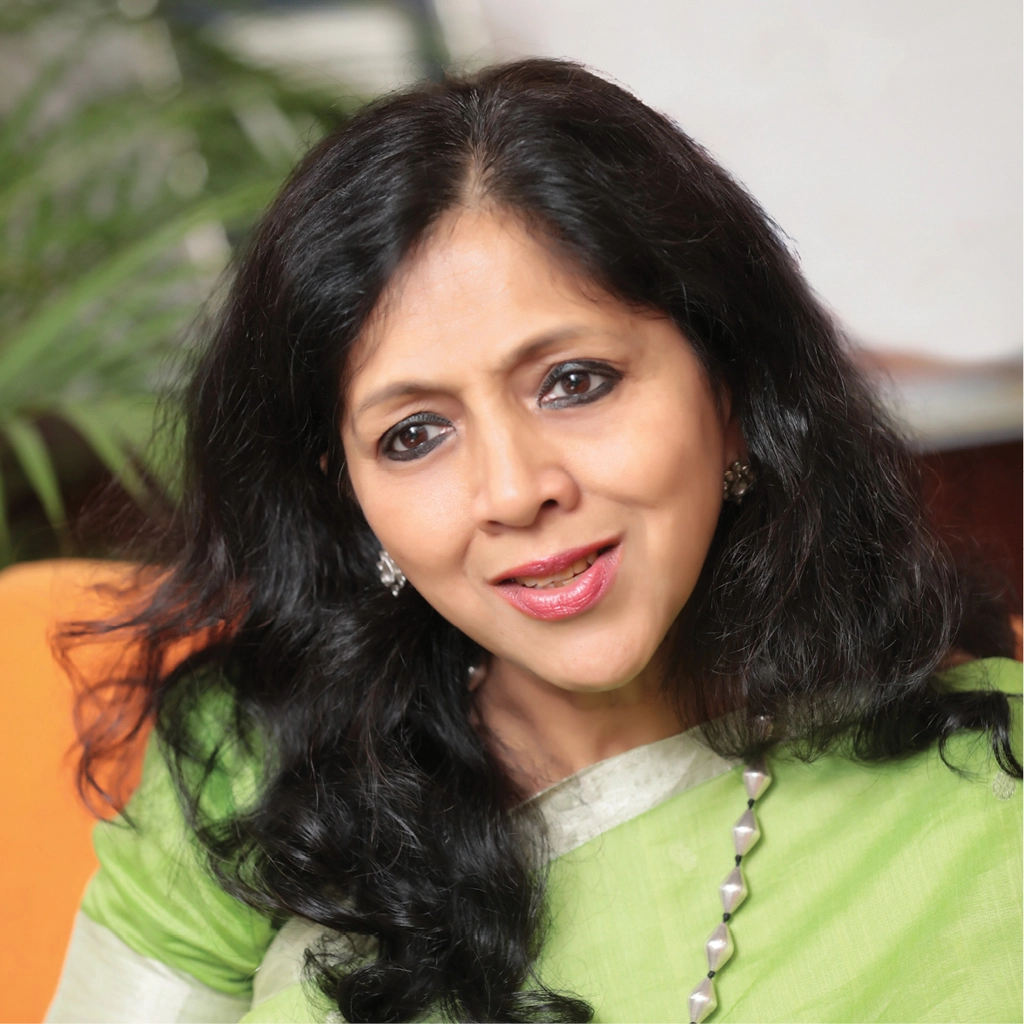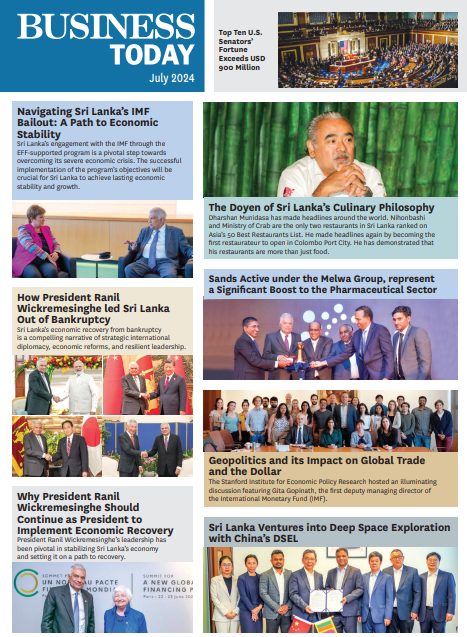
A multinational organisation that is truly Sri Lankan, Nestlé continues to enhance lives in the country by focusing on the three areas it feels it can make the most positive impact: individuals and families, communities, and the environment. Shivani Hegde, Managing Director, speaks about the manner in which 90 per cent of the Nestlé products that are offered in Sri Lanka are locally produced, using mainly local ingredients, whilst ensuring the highest international quality standards. The largest private fresh milk collector in the country, Nestlé strives to help make Sri Lanka self-sufficient in milk. Drawing on its international expertise, the Company continues to introduce innovative, tastier and healthier products to the country.
By Udeshi Amarasinghe
Photography Mahesh Bandara and Menaka Aravinda
Nestlé has been in Sri Lanka for a very long time, how has Nestlé contributed to the country?
Nestlé has been in Sri Lanka for 112 years and our purpose as a company has always been clear – enhancing quality of life and contributing to a healthier future. We are committed to locally producing our products as far as possible, using largely local ingredients, and I’m proud to note that currently more than 90 per cent of our products in the country meet this goal. Nestlé’s approach is to provide better livelihoods to the communities we do business with, and positively impact the lives of everyone we touch across the value chain.
In terms of the dairy farmer community, we work with close to 20,000 farmers across the country, from whom we procure hundreds of thousands of litres of milk every day. We work closely with them to help improve their quality and yield, and offer a lot of assistance in terms of micro-financing, veterinary care, subsidies for equipment and resources. Today, Nestlé is the single largest private fresh milk collector in Sri Lanka after the state-run Milco. We collect around a third of the country’s fresh milk that is commercially available, and paid 3.8 billion rupees to farmers last year for their milk.
This is a big area of our contribution and is something that we have been working on for more than 30 years, in close collaboration with the relevant Ministries. Our endeavour is to make the country self-sufficient in milk production, in line with the Government’s vision to increase milk supply in the country and reduce imports.
We have had success in terms of the yield per cow, which has increased significantly, and have been able to offer Sri Lankan consumers a number of great tasting products made with local fresh milk, such as Nespray, Milo Rtd, Milkmaid, Nescafé Rtd and Nestomalt Rtd.
Another important initiative in the area of community work is our project with coconut farmers, which we started very recently. We are one of the largest exporters of coconut milk powder in the world, and use only Sri Lankan coconut in our product. In fact, we paid 4.9 billion rupees to suppliers for coconut procurement last year. Because coconut cultivation is currently a key concern, we launched the “Nestlé Coconut Plan”, together with the Coconut Cultivation Board (CCB), to increase coconut yield in the country. As part of the programme, we donated 10,000 coconut plantlets to 2,000 outgrowers and coconut farming families. They will grow coconut within the coconut triangle and also in areas outside it which have potential for growing coconut successfully. We are supporting them with the provision of fertilizer, training and other facilities to increase their yields and I’m proud to report that since the launch of the programme in 2016, our plantlets are doing well, with a 95 per cent success rate.
If I talk about the work that we are doing with individuals and families; the first set is of course, our consumers. Here again, with the objective of enhancing lives and contributing towards a healthier future, we want to make sure that our products are not only providing taste but also good health. That is how we can contribute towards a healthier future for the Sri Lankan population. In that aspect, we are fortifying our products with micronutrients that are known to be deficient in the country, such as iron, vitamin A, calcium and zinc. We are also adding positive ingredients like milk, grains, vegetables and spices and continually reducing sugar, salt and fat in our products. In 2017, we provided our consumers 400 million servings of micronutrient fortified foods and beverages. These renovations are done with the help of our R&D Centres to ensure that our product taste is not impacted. We also understand that for people to be healthier they also need to live an active lifestyle. It is not only what you eat but it is also how you live. A lot of our work is happening in this area where we are encouraging the people of Sri Lanka to be more active, whether it is children or adults, through several initiatives. Our Healthy Kids Programme for example, which we do together with the Ministry of Education, teaches children about nutrition while also encouraging them to be more physically active. This is a fairly large programme, in terms of our contribution to society, covering more than 150,000 children in 2017 alone.
Nestlé Can Truly Be Called A Local Multinational. Our Strength Is That We Work As A Sri Lankan Multinational…We Also Have The Opportunity To Benefit From The World Leading R&D Capabilities And Technologies Of Our Parent Company.
We also have a programme called ‘Nestlé Needs YOUth’, which goes far beyond the people in our organisation to increase the employability of youth in the country. The programme attempts to simulate a ‘dual-education system’ because we believe education is not just about what you learn in the university but it is also about learning on the job, and Nestlé wants to give young people that opportunity. Last year, we had more than 80 interns working with us. We also have a MoU with the University of Kelaniya, where we are providing Marketing graduates a diploma in People Management Skills, that is conducted by our own managers. The top 10 students also receive a six month stint with the company. Beyond that, we offer engineering graduates paid training programmes and have also started ‘Readiness-to-Work’ programmes that focus specifically on female undergraduates in rural universities. A voluntary employee group called ‘WIN (Women in Nestlé)’ go out to universities in rural areas and conduct mini workshops on facing job interviews and CV writing to help make students more employable.
The third area we want to have a positive impact on is protecting the environment. As far as our operations go, we constantly strive to reduce our consumption of energy and water and also greenhouse gas emissions. This is not easy to do whilst increasing production volumes every year but I’m proud to say that since 2008 we have reduced our energy consumption by 41 per cent, water consumption by 42 per cent and greenhouse gas emissions by 37 per cent.
Can you elaborate on the performance of the company during the past year?
We recently published our results for 2017, and reported a three per cent topline growth. Overall, the F&B sector has been significantly impacted by sluggish market conditions, which was largely due to the prolonged drought last year. I’m happy to say however that despite an overall slowdown, we have been able to maintain our leadership position in the market, whilst investing for the future.
How important is Nestlé being a multinational to the Sri Lankan context?
Nestlé can truly be called a local multinational. Our strength is that we work as a Sri Lankan multinational. While being in the country for 112 years gives us strong insights to the needs and preferences of the people, we also have the opportunity to benefit from the world leading R&D capabilities and technologies of our parent company. Nestlé today has about 5,000 people globally who are working continuously in research centres across the world. Therefore, it is a good combination of Sri Lankan insights and global R&D.
As far as our products are concerned we are continuously innovating. Once we launch a product, we continually renovate and upgrade it based on how our consumers’ needs are changing. We understand that today people are more conscious about their health and the role that food can play in delivering good health for them. That is where we come in, to make sure that the food we provide as a company meets that need. As a multinational organisation and the largest food and beverage company in the world, Nestlé has its own internal guidelines and standards for the profile of our products, which are even stricter than the national regulations of some countries! We have a nutrition profiling system which ensures that our products offer the best nutrition profile in their categories. This exact same system is implemented in Sri Lanka, thereby ensuring international standards in the products we manufacture. These systems and standards are implemented for all Nestlé companies anywhere in the world. Our regulations are very stringent and we have an internal review that is done by Nestlé headquarters in Switzerland every year.
Being a company that is present in 189 countries across the world also offers a fantastic opportunity for our people. We are able to offer international training and expatriations, to bring back best-practices and skills.
What can you tell us about the industry in general and about Nestlé’s market share?
We are operating in the food and beverages segment and have a presence in almost all the key categories of consumption. We provide products for all age groups and also for different consumption moments. We are maintaining a number one leadership position in almost all the categories that we are present, be it malted drinks, ready to drink beverages, coffee and baby food.
Future plans in Sri Lanka, what more can we expect?
We believe in the country’s growth potential and are continually investing for the future. Our future plans are driven by two aspects – our consumers and our people.
Firstly, we are investing in new products. We are constantly looking at how the consumer is changing in order to understand how their needs are evolving and how we can address those better. Over the last one year, we have introduced over 15 new products. The next few months will see a similar pace of innovation in our portfolio.
We Believe In The Country’s Growth Potential And Are Continually Investing For The Future. Our Future Plans Are Driven By Two Aspects – Our Consumers And Our People.
In terms of our own manufacturing capacity to service the needs of the country, we have made investments in our factory. At the beginning of 2017 we commissioned a new five-billion-rupee investment in which we will be expanding capacity for our products.
Another important aspect where we are investing for the future is in our people. We believe that enhancing their skills in changing times is very important, especially to ensure our employees take advantage of global opportunities. We are making them ‘future ready’ not just through our local programmes but by also sending them to other markets. Last year over one hundred employees were exposed to international programmes.
Can you tell us about yourself and what has your experience been so far in Sri Lanka?
As far as my career goes, I have been with Nestlé throughout. I joined as a Management Trainee straight after my MBA. It has been a long and satisfying journey with Nestlé, over 30 years, and during this period I have spent my time in different functions. I started in marketing and also worked for a while in Sales and HR. The whole intention was to get cross functional exposure and experience in different roles, which is part of our learning culture. I moved to Sri Lanka in 2015 and just before that, I was responsible for Nestlé’s Foods business in the South Asian region for 10 years.
I have had a wonderful experience in Sri Lanka. This is my fourth year and time just flies, which is an indication of the positive experience. It has been great in various ways. The people of Sri Lanka are wonderful. And I have an extraordinary team.
We have a very good operation here in Sri Lanka. Nestlé Lanka is a solid company, which is very highly respected. We have been recognised at various forums for the work that we do. I feel that this is an indication that people see the good work that Nestlé is doing in the country. This gives us the impetus to move on and do even better, knowing that we continue to make a difference.







